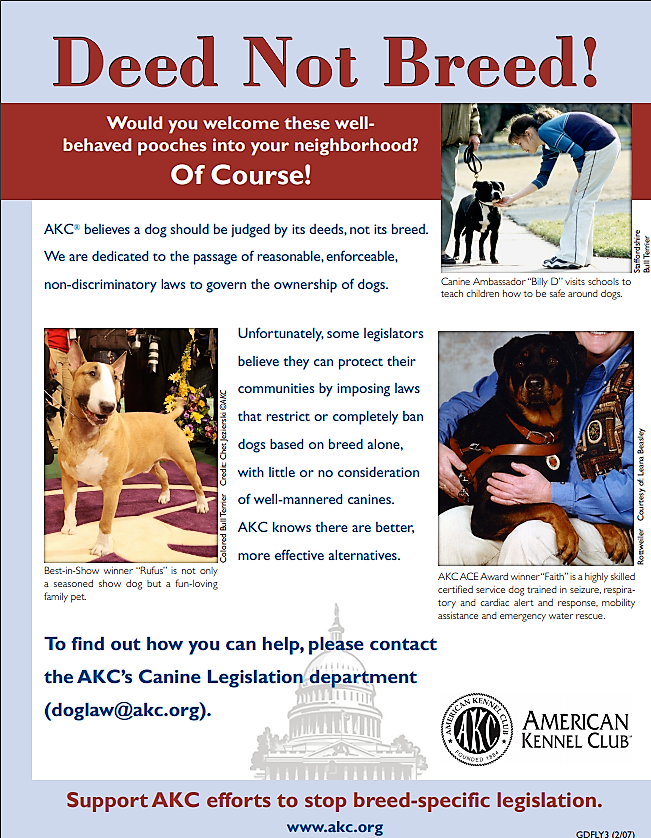|
Breed Specific Bans
A group of laws that bans particular breeds, usually pit bulls (a type of dog, not a breed) and sometimes Rottweilers, German Shepherds, Akitas, Dobermans, Chow Chows, and a few others. These laws are usually passed after several attacks by a particular breed so that city councils can assure citizens they are “doing something” about a voter concern. But breed bans don't work. They target all dogs of a breed -- the innocent as well as the guilty; are difficult to enforce; and do not end the use of guardian dogs by criminals. If pit bulls in their various incarnations are banned, drug dealers and other felons switch to another breed or mix.In the meantime, the ill-tempered terrier mix that bites the hand that feeds it and the poorly-bred purebred that attacks the neighborhood children pose a far greater danger to people than the obedience-trained American Staffordshire Terrier that is a registered therapy dog but cannot step foot inside the city. Far better than breed-specific bans are strict laws to control aggressive dogs of any breed or mix. Known as generic vicious dog laws, they put restrictions on the ownership of dogs that pose a danger to people, restrictions such as confinement in locked, escape-proof kennels while outdoors on the owner's property; muzzles when the dog is off the property; and purchase of a liability insurance policy. Source: Dogs and The Law |
|
Breed specific legislation is exactly what sounds like...regulation of your right to own or, in many cases, not own a dog based solely on the breed or "type" of dog, not your responsibility as an owner.
Breed specific ordinances are quick fixes and not a sufficient long term solution for the following reasons:
Breed specific ordinances are quick fixes and not a sufficient long term solution for the following reasons:
- Dog problems are generally problems with owner responsibility and are not limited to breeds. When breeds are singled out as dangerous or vicious, responsibility is removed from the dog owner which is where it belongs. Irresponsible people are also less likely to follow the law - and as a result, everyone has to suffer.
- By limiting the ability of citizens to own certain breeds, responsible law-abiding citizens will shy away from those breeds. These are the types of owners that communities need to encourage, not drive away.
- Communities that have instituted such bans often find that the irresponsible owners and the criminals who use dogs for illegal purposes simply switch to another breed.
- Breeds and mixes are hard to identify and often dogs are mislabeled and destroyed based on paranoia and prejudice and also punishes those that are good canine citizens. Many breeds function as assistance dogs for handicapped owners, search and rescue dogs, drug-sniffing dogs, police dogs, etc. and drives them out of the community. The American Veterinary Medical Association and several state veterinary medical associations oppose breed-specific legislation for just this reason.
- The dog most restricted is the "pit bull." A pit bull is a type of dog, not a recognized breed. See the breed overview information page for more detail.
- Passage of laws that are only enforced through complaints cause two problems: 1) they create disrespect for the law if authorities require compliance only upon complaint, and 2) they provide ammunition for neighborhood feuds. Suggested alternatives to breed bans include:
- Stronger enforcement of existing dangerous dog laws. If they are not already in place, lobby for protection from untrained and unsupervised dogs of any breed or mix. This is a broad-based effort that protects all citizens as any dog can bite and be a nuisance when owned by an irresponsible owner. Those who would deliberately train a dog to act aggressively towards people or other animals, or to use dogs in the commission of a felony or misdemeanor should face additional penalties.
- Encourage local animal rescue and welfare agencies to provide responsible dog ownership seminars and canine safety education. The American Kennel Club has a free education program created for elementary school children.
- Protect the rights of all citizens with nuisance ordinances such as anti-barking, pooper scooper regulations and leash laws.
